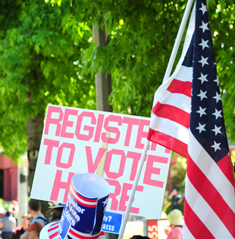May 15, 2014
The IRS has received more than 150,000 responses to proposed regulations for tax exemption for “social welfare“ organizations – a record for an IRS rule-making comment period.
“It is going to take us a while to sort through all those comments, hold a public hearing, possibly re-propose a draft regulation and get more public comments,” IRS Commissioner John Koskinen told the National Press Club in early April. “This means that it is unlikely we will be able to complete this process before the end of the year.”
If Koskinen’s prediction is correct, expect new rules just as the 2016 election cycle is beginning to heat up.
How much political activity may be conducted by an Internal Revenue Code (IRC) Section 501(c)(4) organization has long been the subject of much confusion. To qualify as an IRC Section 501(c)(4) organization, an organization must be organized exclusively to promote social welfare, not for profit.

If political activities do not promote social welfare, and, if in order to qualify under IRC Section 501(c)(4), an organization must be organized exclusively for the promotion of social welfare, the question arises as to how a Section 501(c)(4) organization can conduct any political activities and still qualify as tax-exempt under IRC Section 501(c)(4).
The answer is in the Section 501(c)(4) regulations. These regulations provide that an organization that is primarily engaged in the promotion of social welfare may still qualify. Neither the IRC nor the relevant regulations define primarily in this context, but in the absence of guidance, practitioners have often concluded that, so long as 51 percent of a 501(c)(4) organization’s activities is the promotion of social welfare, the organization can conduct up to 49 percent political activity and still qualify.
Therefore, a tax-exempt 501(c)(4) organization may engage in some political activities, so long as that is not its primary purpose. Even though some political activities are allowable, expenditures for political activities may be subject to income tax under IRC Section 527(f).
In 2013, it was revealed that the IRS may have denied tax-exempt status to certain Sec. 501(c)(4) organizations based on their political leanings. After much public outcry from all parts of the political spectrum, last November the IRS issued proposed regulations that were designed to clarify the definition of political activities that do not promote social welfare. This, in turn, impacts the extent to which a 501(c)(4) organization can engage in political activity without endangering its tax-exempt status.
The proposed regulations sought to replace the current “facts and circumstances” test with more definitive rules to determine whether an organization is engaged in political campaign activities that do not promote social welfare. The new guidance would define the term “candidate-related political activity” and amend current regulations by indicating that the promotion of social welfare does not include this type of activity.
However, the Republican Party has already expressed its view that the IRS’s guidance would go further to limit the amount of political activities in which 501(c)(4) organizations can engage while still keeping their tax-exempt status.
While the IRS’s Notice of Proposed Rulemaking sought to clarify the definition of what constitutes political activity, it did not directly address the question of how much political activity is too much.
The IRS did ask for comments on the definition of primarily in this context of the 501(c)(4) regulations and many commentators have called upon the IRS to address this issue in its future guidance on political activity.
This article was originally posted on May 15, 2014 and the information may no longer be current. For questions, please contact GRF CPAs & Advisors at marketing@grfcpa.com.